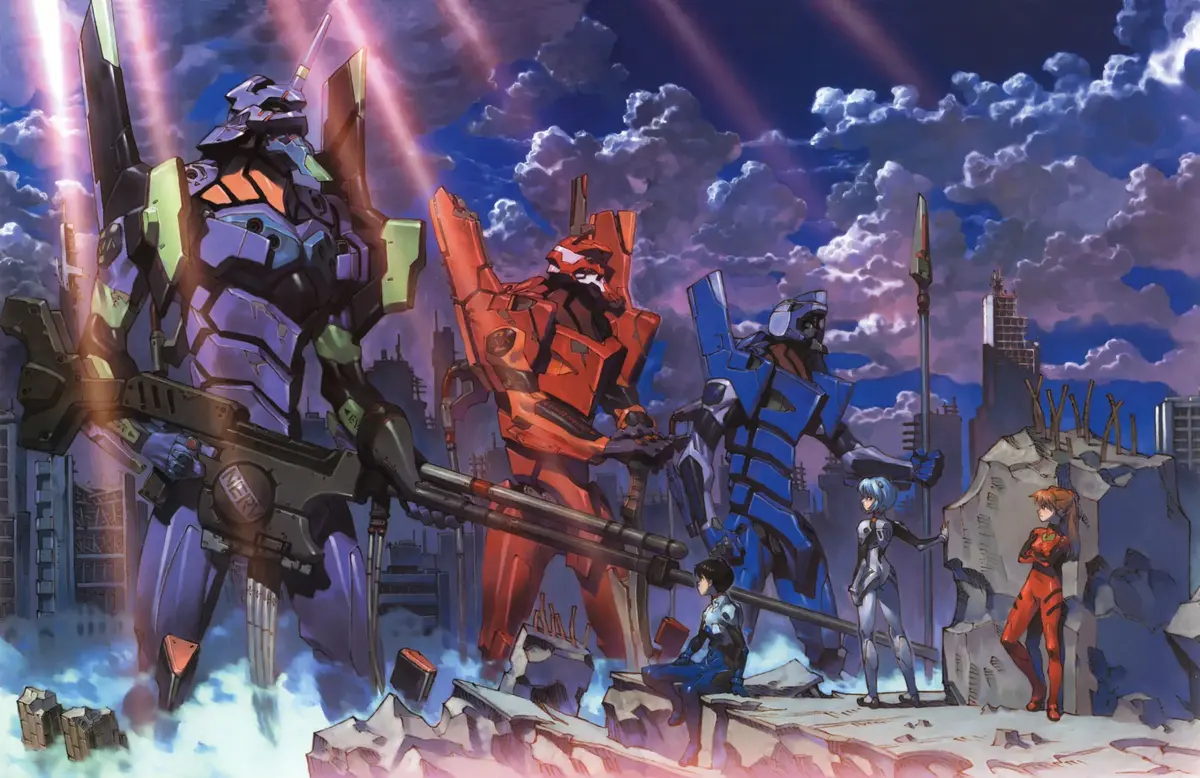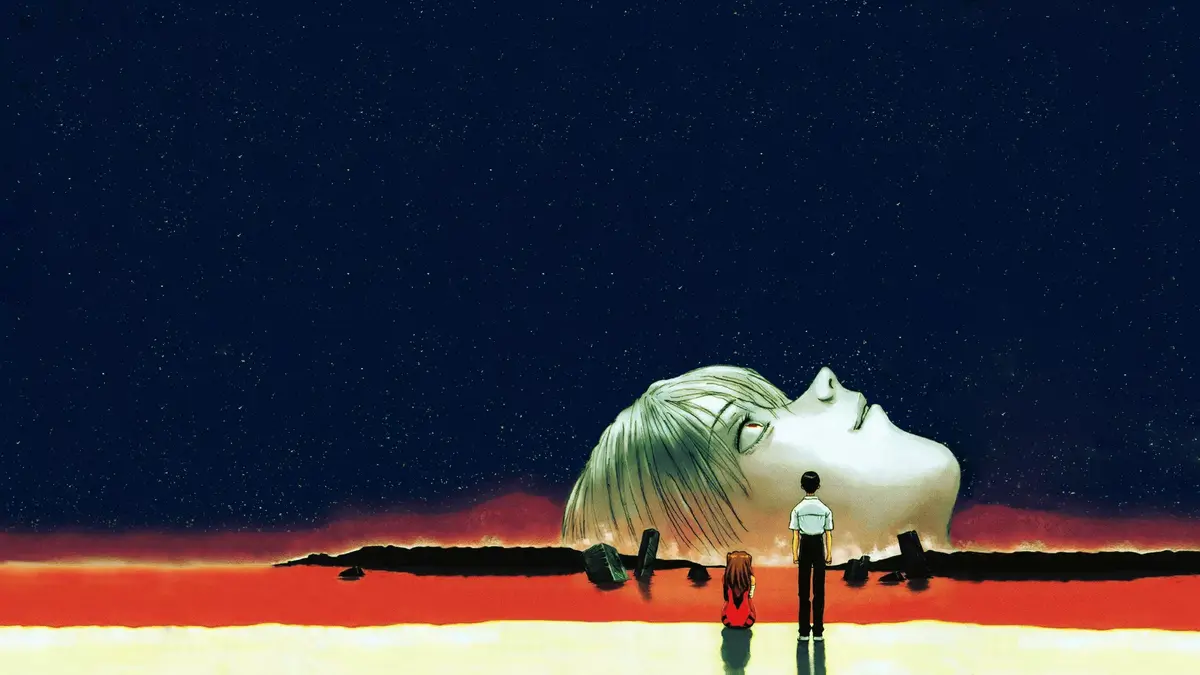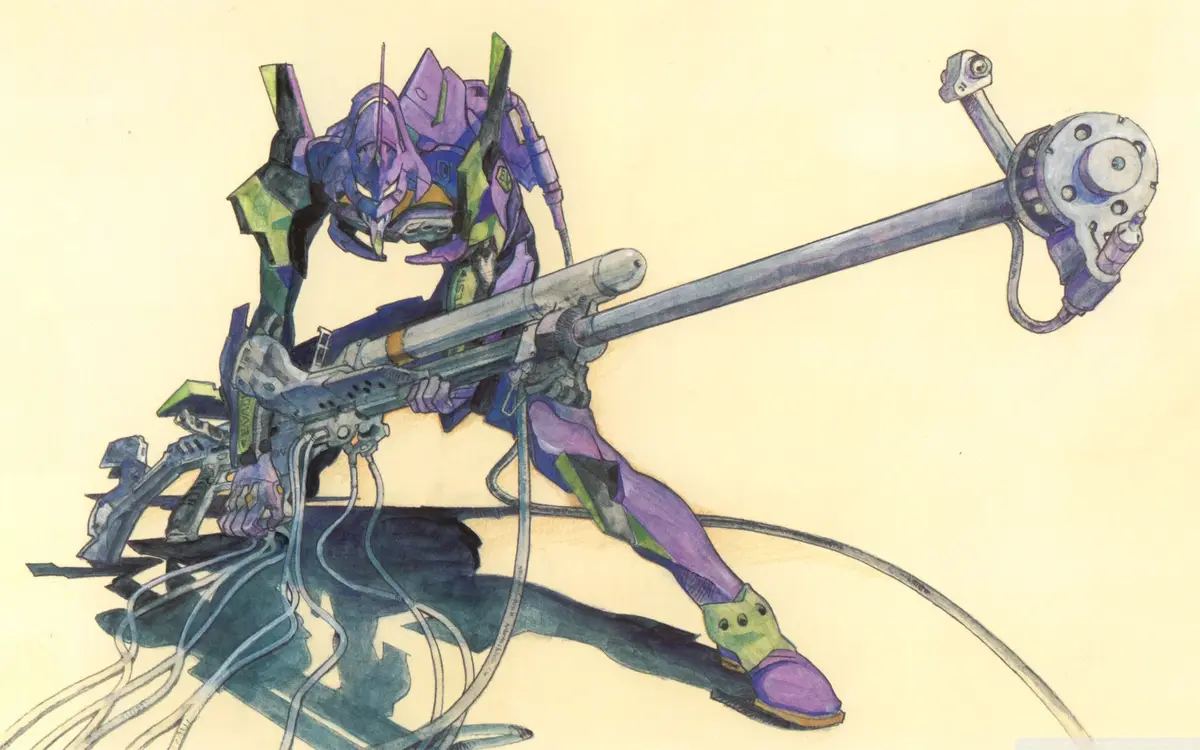When discussing cult anime, Neon Genesis Evangelion stands as an undeniable landmark. Created by Hideaki Anno and produced by Studio Gainax in 1995, it irreversibly shaped Japanese animation through its aesthetics, profound themes, and cultural impact. Beneath its post-apocalyptic mecha facade lies a dense, introspective, and utterly unique work.
The Apocalyptic World of Evangelion
The story begins in a future ravaged by a global catastrophe called the Second Impact. Tokyo-3 is under attack by creatures known as Angels, which only the organization NERV can counter using giant robots called EVAs, piloted by teenagers. The protagonist, Shinji Ikari, is forced by his father, NERV’s director, to pilot EVA-01. This premise conceals an ocean of symbolism, existential dilemmas, and psychoanalytic depth.

Hideaki Anno’s Vision and Psychological Depths
Evangelion didn’t emerge in a vacuum. It was born from a crisis in Japanese animation and the personal depression of its creator. Hideaki Anno infused the series with his doubts, anxieties, and reflections on identity, loneliness, and communication. The result is an anime that deconstructs its own genre while reinventing its codes.
A central theme is existential dread. Each character carries the weight of their past, traumas, and yearning for validation. Shinji, fragile and withdrawn, embodies the struggle to form stable connections. Rei Ayanami, seemingly devoid of humanity, reveals unsettling complexity. Asuka Langley, brilliant yet volatile, masks inner torment.
Artistic Direction and Symbolism
The anime’s artistry is strikingly rich. The biomechanical EVA designs blend technology and flesh, while the Angels offer unpredictable battles. The cinematography employs prolonged silences, unconventional framing, and static shots to amplify psychological tension.

The score by Shirō Sagisu oscillates between majestic orchestral themes and haunting ambient tracks. The opening theme, A Cruel Angel’s Thesis, became a generational anthem, its upbeat tone clashing with the series’ gravity.
Religious and Philosophical Layers
Evangelion brims with religious, philosophical, and psychoanalytic references—Kabbalah, biblical angels, Freudian theory—all woven meaningfully into the narrative. These elements fuel the story’s symbolism without feeling decorative.
The Controversial Climax and Legacy
The series’ finale remains infamous. Due to budget constraints, the last two episodes abandon linear storytelling for total introspection, questioning the very foundations of fiction. This bold move sparked polarizing reactions.
In response, Anno released The End of Evangelion, a film reimagining the ending with darker, explicit themes. It pushes ideas of self-annihilation and validation to their limits.
Evangelion’s influence echoes in works like RahXephon, Darling in the FranXX, and Attack on Titan. Its treatment of trauma, symbolism, and meta-commentary set a benchmark for artistic audacity.
Even today, Evangelion sparks debate. The Rebuild of Evangelion films revisit and reconfigure the story, proving its enduring relevance.
At its core, Evangelion is about solitude—the individual’s struggle to connect, the creator’s dialogue with the audience, humanity’s confrontation with its end. Its contradictions are its strength, cementing its status as a monument of animation.

NEON GENESIS EVANGELION – The Definitive Anime Masterpiece That Redefined a Genre
Table of Contents
When discussing cult anime, Neon Genesis Evangelion stands as an undeniable landmark. Created by Hideaki Anno and produced by Studio Gainax in 1995, it irreversibly shaped Japanese animation through its aesthetics, profound themes, and cultural impact. Beneath its post-apocalyptic mecha facade lies a dense, introspective, and utterly unique work.
The Apocalyptic World of Evangelion
The story begins in a future ravaged by a global catastrophe called the Second Impact. Tokyo-3 is under attack by creatures known as Angels, which only the organization NERV can counter using giant robots called EVAs, piloted by teenagers. The protagonist, Shinji Ikari, is forced by his father, NERV’s director, to pilot EVA-01. This premise conceals an ocean of symbolism, existential dilemmas, and psychoanalytic depth.
Hideaki Anno’s Vision and Psychological Depths
Evangelion didn’t emerge in a vacuum. It was born from a crisis in Japanese animation and the personal depression of its creator. Hideaki Anno infused the series with his doubts, anxieties, and reflections on identity, loneliness, and communication. The result is an anime that deconstructs its own genre while reinventing its codes.
A central theme is existential dread. Each character carries the weight of their past, traumas, and yearning for validation. Shinji, fragile and withdrawn, embodies the struggle to form stable connections. Rei Ayanami, seemingly devoid of humanity, reveals unsettling complexity. Asuka Langley, brilliant yet volatile, masks inner torment.
Artistic Direction and Symbolism
The anime’s artistry is strikingly rich. The biomechanical EVA designs blend technology and flesh, while the Angels offer unpredictable battles. The cinematography employs prolonged silences, unconventional framing, and static shots to amplify psychological tension.
The score by Shirō Sagisu oscillates between majestic orchestral themes and haunting ambient tracks. The opening theme, A Cruel Angel’s Thesis, became a generational anthem, its upbeat tone clashing with the series’ gravity.
Religious and Philosophical Layers
Evangelion brims with religious, philosophical, and psychoanalytic references—Kabbalah, biblical angels, Freudian theory—all woven meaningfully into the narrative. These elements fuel the story’s symbolism without feeling decorative.
The Controversial Climax and Legacy
The series’ finale remains infamous. Due to budget constraints, the last two episodes abandon linear storytelling for total introspection, questioning the very foundations of fiction. This bold move sparked polarizing reactions.
In response, Anno released The End of Evangelion, a film reimagining the ending with darker, explicit themes. It pushes ideas of self-annihilation and validation to their limits.
Evangelion’s influence echoes in works like RahXephon, Darling in the FranXX, and Attack on Titan. Its treatment of trauma, symbolism, and meta-commentary set a benchmark for artistic audacity.
Even today, Evangelion sparks debate. The Rebuild of Evangelion films revisit and reconfigure the story, proving its enduring relevance.
At its core, Evangelion is about solitude—the individual’s struggle to connect, the creator’s dialogue with the audience, humanity’s confrontation with its end. Its contradictions are its strength, cementing its status as a monument of animation.